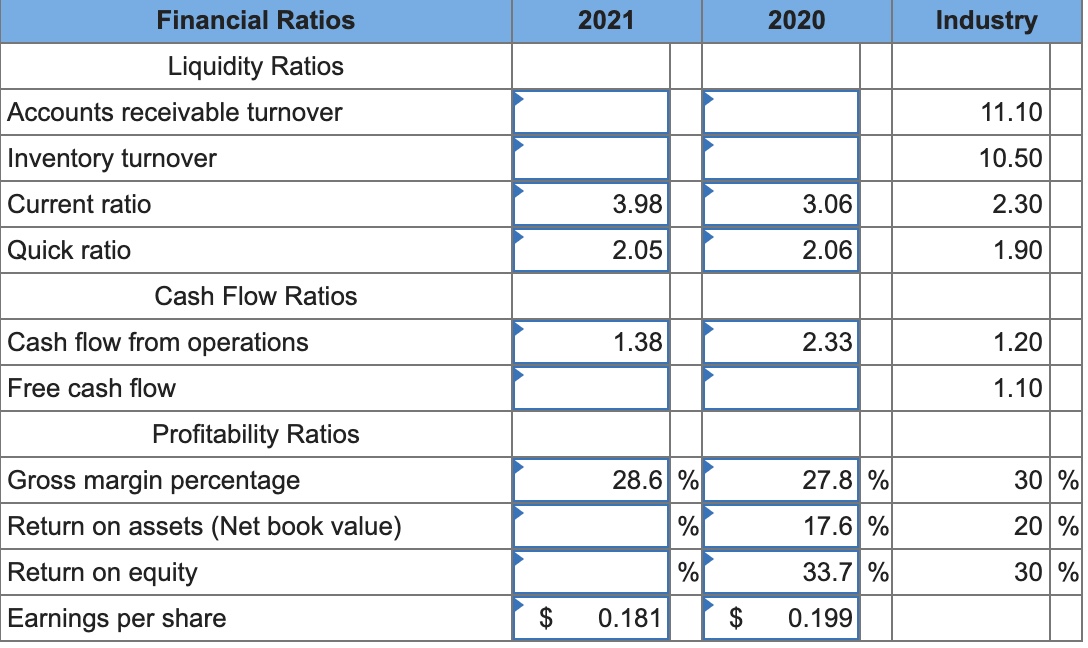Question
Williams Company is a manufacturer of auto parts having the following financial statements for 20212022. Balance Sheet December 31 2022 2021 Cash $ 260,000 $
Williams Company is a manufacturer of auto parts having the following financial statements for 20212022.
| Balance Sheet | ||
|---|---|---|
| December 31 | ||
| 2022 | 2021 | |
| Cash | $ 260,000 | $ 135,000 |
| Accounts receivable | 150,000 | 225,000 |
| Inventory | 385,000 | 175,000 |
| Total current assets | $ 795,000 | $ 535,000 |
| Long-lived assets | 1,640,000 | 1,500,000 |
| Total assets | $ 2,435,000 | $ 2,035,000 |
| Current liabilities | 200,000 | 175,000 |
| Long-term debt | 900,000 | 800,000 |
| Shareholders equity | 1,335,000 | 1,060,000 |
| Total debt and equity | $ 2,435,000 | $ 2,035,000 |
| Income Statement | ||
|---|---|---|
| For the years ended December 31 | ||
| 2022 | 2021 | |
| Sales | $ 3,500,000 | $ 3,600,000 |
| Cost of sales | 2,500,000 | 2,600,000 |
| Gross margin | 1,000,000 | 1,000,000 |
| Operating expenses* | 500,000 | 450,000 |
| Operating income | 500,000 | 550,000 |
| Taxes | 175,000 | 192,500 |
| Net income | $ 325,000 | $ 357,500 |
| Cash Flow from Operations | ||
|---|---|---|
| 2022 | 2021 | |
| Net income | $ 325,000 | $ 357,500 |
| Plus depreciation expense | 60,000 | 50,000 |
| + Decrease (increase) in accounts receivable and inventory | (135,000) | |
| + Increase (decrease) in current liabilities | 25,000 | |
| Cash flow from operations | $ 275,000 | $ 407,500 |
*Operating expenses include depreciation expense.
Additional financial information, including industry averages for 2022, where appropriate, includes:
| 2022 | 2021 | Industry 2022 | |
|---|---|---|---|
| Capital expenditures | $ 125,000 | $ 100,000 | |
| Income tax rate | 35% | 35% | 35.0% |
| Depreciation expense | $ 60,000 | $ 50,000 | |
| Dividends | $ 50,000 | $ 50,000 | |
| Year-end stock price | $ 2.25 | $ 2.75 | 25.00 |
| Number of outstanding shares | 1,800,000 | 1,800,000 | |
| Sales multiplier | 1.50 | ||
| Free cash flow multiplier | 18.00 | ||
| Earnings multiplier | 9.00 | ||
| Cost of capital | 5.0% | 5.0% | |
| Accounts receivable turnover | 11.10 | ||
| Inventory turnover | 10.50 | ||
| Current ratio | 2.30 | ||
| Quick ratio | 1.90 | ||
| Cash flow from operations ratio | 1.20 | ||
| Free cash flow ratio | 1.10 | ||
| Gross margin percentage | 30.0% | ||
| Return on assets (net book value) | 20.0% | ||
| Return on equity | 30.0% |
Required:
Calculate and interpret the financial ratios (see Exhibit 20.9) for Williams for both years. Because the calculation of many ratios requires the average balance in an account (e.g., average receivables is required in calculating receivables turnover), you may assume for simplicity that the balances in these accounts in 2021 are the same as those in 2020. (Round "Earnings per share" to 3 decimal places, other "Profitability Ratios" to 1 decimal place (i.e. 0.123 = 12.3%) and rest of the answers to 2 decimal places.)
 \begin{tabular}{|c|c|c|c|c|c|c|} \hline Financial Ratios & \multicolumn{2}{|l|}{2021} & \multicolumn{2}{|l|}{2020} & \multicolumn{2}{|l|}{ Industry } \\ \hline Liquidity Ratios & & & & & & \\ \hline Accounts receivable turnover & & & & & 11.10 & \\ \hline Inventory turnover & & & & & 10.50 & \\ \hline Current ratio & 3.98 & & 3.06 & & 2.30 & \\ \hline Quick ratio & 2.05 & & 2.06 & & 1.90 & \\ \hline Cash Flow Ratios & & & & & & \\ \hline Cash flow from operations & 1.38 & & 2.33 & & 1.20 & \\ \hline Free cash flow & & & & & 1.10 & \\ \hline Profitability Ratios & & & & & & \\ \hline Gross margin percentage & 28.6 & % & 27.8 & % & 30 & % \\ \hline Return on assets (Net book value) & & % & 17.6 & % & 20 & % \\ \hline Return on equity & & % & 33.7 & % & 30 & % \\ \hline Earnings per share & 0.181 & & 0.199 & & & \\ \hline \end{tabular}
\begin{tabular}{|c|c|c|c|c|c|c|} \hline Financial Ratios & \multicolumn{2}{|l|}{2021} & \multicolumn{2}{|l|}{2020} & \multicolumn{2}{|l|}{ Industry } \\ \hline Liquidity Ratios & & & & & & \\ \hline Accounts receivable turnover & & & & & 11.10 & \\ \hline Inventory turnover & & & & & 10.50 & \\ \hline Current ratio & 3.98 & & 3.06 & & 2.30 & \\ \hline Quick ratio & 2.05 & & 2.06 & & 1.90 & \\ \hline Cash Flow Ratios & & & & & & \\ \hline Cash flow from operations & 1.38 & & 2.33 & & 1.20 & \\ \hline Free cash flow & & & & & 1.10 & \\ \hline Profitability Ratios & & & & & & \\ \hline Gross margin percentage & 28.6 & % & 27.8 & % & 30 & % \\ \hline Return on assets (Net book value) & & % & 17.6 & % & 20 & % \\ \hline Return on equity & & % & 33.7 & % & 30 & % \\ \hline Earnings per share & 0.181 & & 0.199 & & & \\ \hline \end{tabular} Step by Step Solution
There are 3 Steps involved in it
Step: 1

Get Instant Access to Expert-Tailored Solutions
See step-by-step solutions with expert insights and AI powered tools for academic success
Step: 2

Step: 3

Ace Your Homework with AI
Get the answers you need in no time with our AI-driven, step-by-step assistance
Get Started


